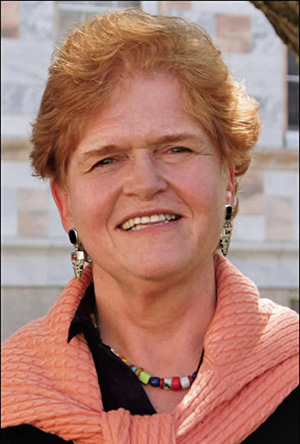

Since the recent release of the movie “Denial,” Deborah Lipstadt has packed lecture halls and theaters all over the nation. A cool, fall Thursday night was no different when she asked a crowded auditorium to imagine for a moment that each person there was on a plane beginning a long flight. You happen to sit next to a man named David Irving.
You begin a conversation, asking Irving, “What do you do?” He tells you that he writes about the Holocaust.
You comment, “That was a tremendous tragedy.”
Lipstadt continues, “The man says, ‘I have some good news; it didn’t really happen.’ For the next four or five hours he’s chewing your ear off. Your natural question would be what is the purpose for the Jews to make up this myth, this story?”
The Holocaust scholar and author said that there’s a perception that Israel is a direct result of the “outgrowth of the Shoah.”
“The second thing is that we got reparations, money. So the Jews made up this story to benefit themselves, once again conniving and tricking the whole world into supporting them.”
Lipstadt did go on a “journey” of sorts with David Irving. It started in 1996 when she and Penguin Books, her publisher, were sued for libel in England by Irving after she had called Irving a Holocaust denier in her book “Denying the Holocaust: The Growing Assault on Truth and Memory.”
According to British law, the burden of proof in such cases rests with the defendant. It was Lipstadt and her attorneys who would have to prove that what she had written about Irving was indeed true. She and her legal team were not out to prove that the Holocaust had happened. Instead, they used the very footnotes in Irving’s works to show where he had changed events, chronological orders and other details. In short, he created a lie, choosing to favorably portray Hitler.
The 10-week trial, which ended in Lipstadt’s favor, is the subject of this fall’s feature film “Denial,” with Academy Award-winning actress Rachel Weisz playing Lipstadt.
On the film, Lipstadt said that the efforts by Weisz, her co-stars and the entire production team were focused on getting it right. She added that Weisz eagerly sought her help even on the set. And yes, she was pleased by the result of the film and said she hopes “the film does some good.”
Lipstadt is the Dorot Chair of Modern Jewish History and Holocaust Studies at Emory University, which fully supported her financially and morally during her leave of absence to help with the filming in London.
“When I first heard of Holocaust denial, I thought it was ludicrous,” said Lipstadt. “What intrigued me was their reasoning. The Holocaust had the distinction of being one of the best-documented genocides in history. The Germans were so careful to document the genocide. We have documents including the plans for the gas chambers, their plans to cremate people. There has never been a war -crimes trial where the defendant has said this didn’t happen. What they did say was I didn’t do it, or I had no choice, I was forced to do it.”
Deniers, continued Lipstadt, will say that if the Germans were so efficient then why are there survivors? The existence of survivors, she said, proves to the deniers that the Holocaust is a “myth.”
“We were intent on pulling the ground out from under him,” she said. “We were intent to follow his footnotes. Irving was intent on depicting Hitler as a good guy. He’s written from Hitler’s perspective. He saw himself as Hitler’s biographer. He called Hitler the best friend the Jews had in Germany.”
Lipstadt then gives an example of how the truth was misrepresented by Irving. The Holocaust denier wrote that Hitler sent a communique that the arson against Jewish shops and the like should halt. But Lipstadt pointed out that what Irving didn’t say was that the Nazis didn’t want the fires to spread to non-Jewish shops.
“You get manipulations, a change of sequence. He would claim that people were at certain meetings, and they weren’t there. We were showing the falsehood of what he argued and we did it very well.”
Also, Lipstadt’s legal team did not call any survivors to the witness stand. The idea was to keep the pressure on Irving’s flawed evidence, not to question the historicity of the Holocaust.
“We didn’t want a survivor in the witness box so that Irving could embarrass and abuse and persecute him.”
She told the Jewish Link that students in high school and college need to learn about the facts of the Holocaust for a “much bigger reason” than just to refute “our attackers. “It’s rewriting of history,” she continued. “This is not simply a Jewish issue. It’s about the denial of truth. If anything threatens our civilization, it’s that as much as anything else.”
By Phil Jacobs









